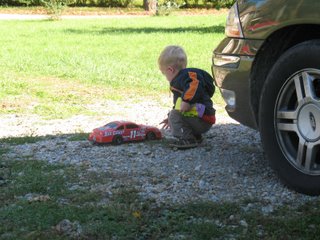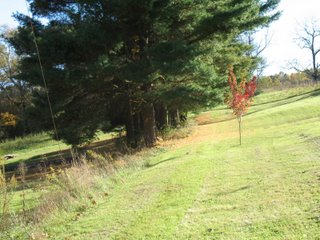Saturday, October 28, 2006
Friday, October 27, 2006
writers I don't love
Anita Brookner (I know a lot of people love her, but I just can't get past the 1st pages of any of her novels).
Barbara Pym (ditto).
Annie Proulx: too many dashes.
Tom Wolfe (I'm more OK with Thomas Wolfe).
Arthur Conan Doyle: I like him better when Basil Rathbone is playing Holmes.
Anthony Trollope (maybe I just can't stand how fast he wrote).
Jasper Fforde (I know, he's very clever).
William Trevor (just can't warm up to him--too many farmhouses, too many depressed women anxiously wiping their hands on a towel).
Hawthorne: house of the seven comas; and I hate that birthmark story.
Ayn Rand: one of her heroines is raped but loves the man who did it; plus it's worth saying twice.
Wednesday, October 25, 2006
writers I love: Tolstoy

I reread "The Death of Ivan Ilyich" for the 10th or 12th time today, because I'd assigned it to my intro fiction students. Just as every other time, I was swept away, overwhelmed, seduced. It's such a wonderful story, although story is a misnomer--it's at least as long as a novella. But who cares what it's called--it's a juggernaut.
If you haven't read it, the plot is that Ivan dies. It begins with his funeral and after looping back at the end of the service, ends with his death. Nothing else--just Ivan dying for ever so many pages, and yet it's suspenseful and tender and amazing. It reminded this time of a story by Margaret Atwood, "Happy Endings," which isn't so much a story as an essay, where she deconstructs the ur-plot of the story--the thing that lies behind every story.
She begins
John and Mary meet.
What happens next?
If you want a happy ending, try A.
There's an A, which is a happy story; then a B, which introduces some complications. Then C, which introduces Madge, Fred, and James, and adultery. D features a tidal wave, and so on. At the end of the story:
You'll have to face it, the endings are the same however you slice it. Don't be deluded by any other endings, they're all fake, either deliberately fake, with malicious intent to deceive, or just motivated by excessive optimism if not by downright sentimentality.
The only authentic ending is the one provided here:
John and Mary die. John and Mary die. John and Mary die.
Ivan Ilyich dies. But in between the funeral and the last breath is a world of piercing and beautiful prose, a story that uses irony but is not ironic. It says some witty things, and some wise things, and some horrible things that people do and say, but don't want to admit. It made me cry, not for the first time; and think, not for the first time, that yes, Tolstoy is amazing, that if there was a Religion of Writing, he'd be one of the gods we ought to pray to.
Here's the full text.
Saturday, October 21, 2006
cutting vs. embellishing
I'm not sure what I think. I do find word and phrase cutting pretty easy--I've often cut something in a snip-snip way so I could do it at a reading and not exceed my time (and often I find many of the cuts to be so reasonable that I let them stand). But I'm by nature an embellisher--when I sit down at the computer my brain starts going with new characters who must be put in, a subplot here, a new complication there.
I've started thinking in terms of scenes that might go. I love the chapter where Carl and Jason go out to look at the iron furnace out in the woods and Carl falls in and has to be rescued, but maybe it's not essential. And then when Carl and Emma go to look for Lily in Conkle's Hollow--does that really need to be two chapters? Couldn't it be one, and much shorter?
What do other writers do with these short-circuited chapters and scenes? I myself preserve them frugally in a separate folder and I tell myself that maybe I'll use them later, in a short story of their own perhaps. But mainly I save them because I can't bear to let them go absolutely, which is probably one of the 7 deadly faults of writers, an idea which maybe deserves a post of its own.
Tuesday, October 17, 2006
back at the computer

I went off to Logan over the weekend, and all the time I was gone didn't so much as look at a computer, except when my daughter was downloading the 63 pictures I took of my grandsons and various trees and hillsides and cloud formations. It was a nonword weekend, or I suppose a nonwriting weekend, since words were used. Z and C are getting into the wordly frame of mind. If you say something, Z is likely to say it after you. They're both in love with animal sounds: I don't know when I last said "moo" or "baaa" so many times. The words for various vehicles are also important: Car. Truck. Tractor.  The weather was particularly fine, and we spent a fair amount of time outdoors, which made me realize how indoor a person I am. The computer is indoors, of course, which is part of it, I suppose. But I do have a laptop now, so theoretically I could take it with me and write anywhere: the park, the library, on a rock overlooking Lake Erie. I can be one of those serious people in coffeeshops, although it often turns out that they're playing solitaire or sudoku online. But if I can I'd rather be looking out at something that looks like this.
The weather was particularly fine, and we spent a fair amount of time outdoors, which made me realize how indoor a person I am. The computer is indoors, of course, which is part of it, I suppose. But I do have a laptop now, so theoretically I could take it with me and write anywhere: the park, the library, on a rock overlooking Lake Erie. I can be one of those serious people in coffeeshops, although it often turns out that they're playing solitaire or sudoku online. But if I can I'd rather be looking out at something that looks like this.
I believe that my writing might somehow become more lofty, more expansive, if I looked up from the screen at this curve of hill, the soft brushy grass, the height of these pines. But maybe not.
Thursday, October 12, 2006
what meetings are good for
Thus, I put in some fruitful time this morning at the meeting. I covered 2.5 pp. of the legal pad with notes, thoughts, reminders, etc. Some were purely pragmatic (meet with Erin at 2 on Monday, or Buy milk!). But at least half of it was taken up with the great over-arching epic idea I had for another novel.
No, I don't want to say what it is, because that would feel so unlucky. It even feels unlucky to say I had an idea, but I find that having a blog draws these admissions out of you, whether you will or no.
Sunday, October 08, 2006
who am I if I'm not writing the novel?
But then you are not writing the novel, and you have to say much more boring things like, I'm taking some time off from writing, or I'm thinking about some short stories, and your listener will be able to sense your restlessness and dissatisfaction.
Virginia Woolf said that she always liked to have another project to turn to when she finished a book--in her case, it was to stave off a killing depression. I'm not so worried about that, but I did think I'd like to have a project in mind--what will I be working on when the novel is finally and truly done? I've set myself to think about this several times, and so far have no answer. I've toyed with past ideas, but nothing has stepped forward to say, "Write me." So I don't know. My idea files are full of wonderful stuff--titles, first sentences, vague ideas, bits of dialogue, as here
"My father got a speeding ticket the year before he died."
Or
a story abt the guy down the street, his PTSD, his Vietnam history, his feud with sometimes other neighbors; his little dog; how he scraped and painted one side of his house per year, meticulously; how at the height of his feud he dressed in camo fatigues and spoke about doing reconnaissance, going in country, etc.
Or
a story called "The Dream of Snow
Or a character named Aunt Babydoll.
But what I wish right now is that someone else would write about these things. And then I could read them.


